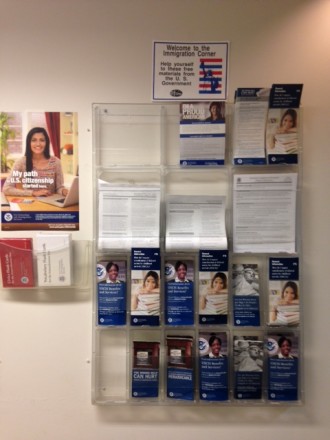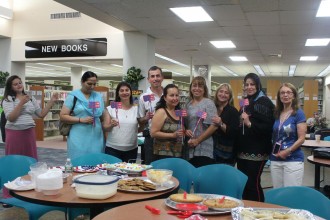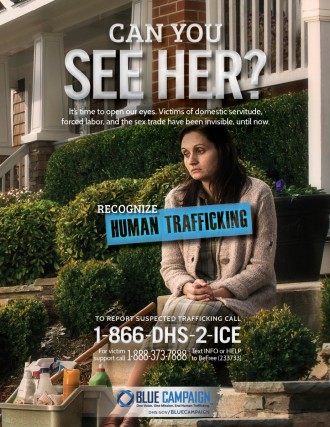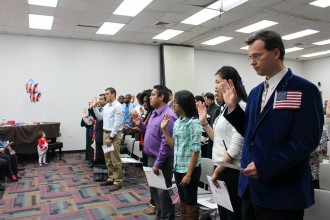Public Libraries Collaborating with USCIS to Help Immigrants
Public libraries across the U.S. have seen a dramatic rise in the number of immigrants using the library. Depending on the geographic location, their reasons for finding us may vary widely. In some areas they may be newly arrived immigrants who’ve been brought here by family members, and are looking for basic English instruction. In others, they may be refugees looking for housing and food. In any scenario, the public library can help immigrants navigate through their new lives by collaborating with U.S. Citizenship and Immigration Service (USCIS).
USCIS, which is part of the U.S. Department of Homeland Security, recognizes the value of partnering with public libraries. Many immigrants view libraries as a trusted place to find information and resources. Therefore, representatives from USCIS encourage librarians to connect library users with them. In New Jersey, USCIS offices are always available to answer questions about immigration from library users and librarians. John E. Thompson, the Director of the USCIS Newark Office says that USCIS community relations officers like working with libraries because “they provide a welcoming, common ground—a place where immigrants can come to find out about immigration benefits in a setting that is convenient and familiar.”
Helping to Prevent Immigration Scams
As they say, “The wrong kind of help can hurt.” This is especially true when immigrants receive incorrect information about immigration laws and procedures. For example, some businesses “guarantee” that they can provide a Green Card, with a higher fee to file the application than the USCIS charges. They falsely claim they can do this faster than applying directly with USCIS.
To avoid immigration scams such as this, the government has published clearly written information on all aspects of immigration, both on their website and in printed brochures. This information is available in several languages. Public libraries are encouraged to display the free brochures and immigration forms for immigrants to take home. In areas called “Citizenship Corners,” immigration resources are now set up in hundreds of libraries across the country. Some larger cities like Boston, New York, and Chicago have signed letters of agreement with USCIS that include the establishment of these Citizenship Corners. But many smaller communities would also benefit from having Citizenship Corners in their local libraries. Librarians are encouraged to reach out to USCIS Community Relations Officers and learn how to get the materials to set up a Citizenship Corner.
Outreach Visits from Local USCIS Representatives
While they are very useful, government publications are not the only service your library can provide with the help of USCIS. You can also ask your local USCIS Community Relations Officer to come to the library for a Naturalization Information Session. At this free, two-hour session which is open to the public, immigrants can have all of their naturalization questions answered by a government official. He or she will also explain the naturalization process and the forms that need to be filled out. Again, library users can trust that they are getting correct information as opposed to immigration scams. The library needs only to provide the space for a session.
Does your library offer citizenship classes? If you are fortunate enough to have a teacher or a librarian available to prepare people for the citizenship exam, it can be a great help to your community. The USCIS office can provide study materials for classes, including flash cards that cover the 100 questions on the test.
At the last class of the 12-week session at Piscataway Public Library in New Jersey, we invited our local USCIS representative to join us. At this class, which was also a celebration, Cruz Builes, Supervisory Immigration Services Officer, joined us. Ms. Builes discussed what to expect in a naturalization interview and answered students’ questions. She inspired confidence in the students and was a welcome addition to the class.
Online USCIS Support for Libraries
USCIS also has many resources available for librarians online. Most can be found at this page, specifically devoted to librarians: https://www.uscis.gov/citizenship/organizations/libraries. There is also a page with tips on how to establish Citizenship Corners in your library: https://www.uscis.gov/citizenship/organizations/libraries/citizenship-corners
And you can bolster the immigration resources you provide on your library’s website by adding a USCIS widget: https://www.uscis.gov/citizenship/organizations/citizenship-public-education-and-awareness-initiative/widgets-english-static
The Blue Campaign
The Blue Campaign is an effort by the U.S. Department of Homeland Security (DHS) to raise awareness about and combat human trafficking. Working in collaboration with law enforcement, government, non-governmental and private organizations, the Blue Campaign strives to protect individuals’ freedom and to bring to justice those who exploit human lives.
For public libraries, involvement in the Blue Campaign can mean partnering with the Department of Homeland Security to raise awareness of this important issue. There are various posters and handouts available to display at your library. Some of these publications describe sex trafficking, for example, and explain what the public can do to help stop this crime. Others explain forced labor or domestic servitude. For a catalog of resources in the Blue Campaign that you can display at your library, go to http://www.dhs.gov/blue-campaign/resource-catalog
Naturalization Ceremonies
When immigrants have successfully completed all of the steps of the naturalization process, including passing the exam, they can attend a naturalization ceremony. At this ceremony they are shown videos about being proud to be an American, including a welcome message from the President of the United States. They sing the National Anthem and say the Pledge of Allegiance. Finally, they swear an oath of citizenship. Often these ceremonies are held in a courthouse or in the immigration office, but in New Jersey and many other jurisdictions in the country they can be held at other venues—like libraries!
Naturalization ceremonies may be one of the most important days in an immigrant’s life. The event is very moving, with patriotic music and flag waving, tears and smiles. The families and friends of the applicants come to celebrate and take pictures.
So, why not see if you are in a jurisdiction where you can host a naturalization ceremony at your public library? What better place to begin life as a new American? If your library offers citizenship classes, and some of the students have recently passed the test, they can become American citizens at the library.
The process of hosting a naturalization ceremony is not difficult because USCIS runs the event. The library only needs to provide an appropriate space. The immigration officials work closely with the library to ensure that everything goes smoothly.
As I said in my Welcoming remarks at our library’s naturalization ceremony, it was lovely to see the support of the applicants’ families and friends on such a special day. But I also wanted them to know that they will always have the support of their public libraries. We are here to help them learn and accomplish their goals as new Americans.
When public libraries collaborate with USCIS, it is beneficial not only for the libraries and their patrons. Because America is a nation of immigrants, the mission of USCIS is to provide accurate and useful information to immigrants, and to promote an awareness and understanding of citizenship. Public libraries can help accomplish this mission by disseminating that information, and by connecting immigrants with the people who can help them. “We know that libraries are a trusted and accessible resource in local communities, particularly in immigrant communities,” said Laura Patching, chief of the Office of Citizenship at USCIS. “That makes them critical partners in our efforts to ensure that complete and accurate immigration information and materials are readily available to those who need them.”
How can you find a local USCIS office to collaborate with? You can start by emailing public.engagement@uscis.dhs.gov and asking to be connected with the local Community Relations Officer. When you reach out, you’ll find they are more than happy to establish a relationship with a public library.
Tags: service to immigrants at the library, USCIS and public libraries














